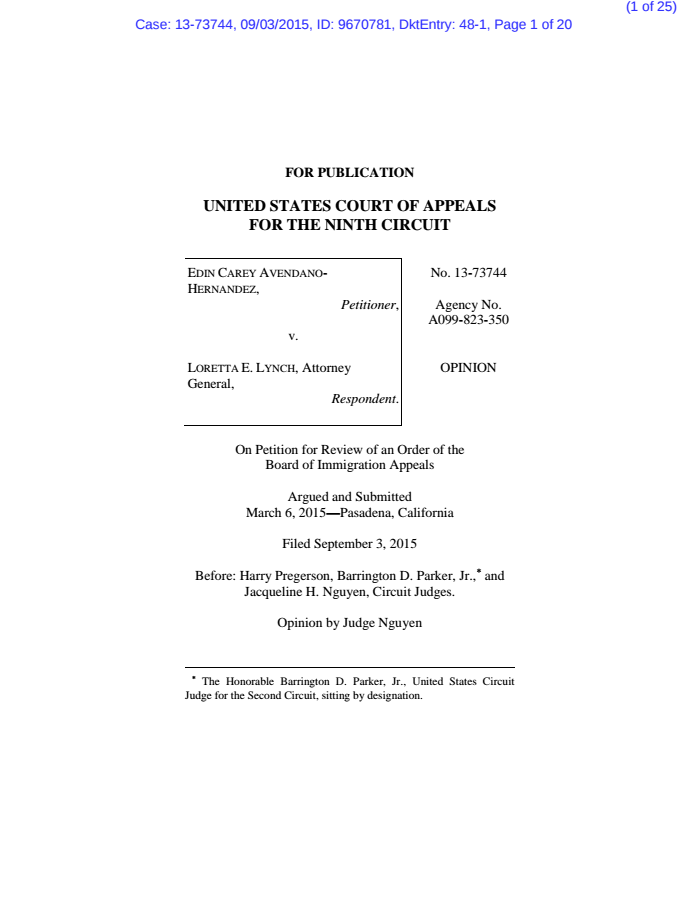
The Ninth Circuit Court of Appeals in California on Thursday ordered suspended the deportation of a transgender immigrant woman and told immigration courts within its jurisdiction that it must consider the dangers trans people face when weighing similar cases.
Immigration advocates for LGTB people said the ruling sets the precedent they were hoping for in dealing with trans applicants seeking to flee oppressive and dangerous conditions in their home countries.
The appeals court remanded the case of Carey Avendano-Hernandez because the immigration court and Board of Immigration Appeals (BIA) failed to consider the specific harms faced by transgender women in Mexico. In the meantime, the order means she cannot be deported.
The Ninth Circuit also found that the Board of Immigration Appeals erred in assuming that recent anti-discrimination laws in Mexico for gays made life safer for transgender people, ignoring “significant” cases of violence against the trans community.

In her opinion, Judge Jacqueline H. Nguyen wrote that “the unique identities and vulnerabilities of transgender individuals must be considered in evaluating a transgender applicant’s asylum, withholding of removal, or [Convention Against Torture] claim."
She added: “Laws recognizing same-sex marriage may do little to protect a transgender woman like Avendano-Hernandez from discrimination, police harassment, and violent attacks in daily life."
Avendano-Hernandez was one of three transgender immigrant Mexican women seeking protection from deportation in cases before the Ninth Circuit that attorneys and advocates had hoped would set a precedent for how immigration courts distinguish between gender identity and sexual orientation.
Despite her victory at the Ninth Circuit on Thursday, Avendano-Hernandez's deferral of removal could later be terminated if conditions in Mexico improve.
Still, Munmeeth Soni, an attorney with the pro-bono Public Law Center who represented Avendano-Hernandez, told BuzzFeed News that the ruling "will have a huge impact."
"The court got it right and it’s a great decision on behalf of and for the transgender community," Soni said.
Even in courts outside the Ninth Circuit's jurisdiction, the ruling could bolster the argument in cases involving transgender women from places other than Mexico, Soni said.
“We are relieved that Carey will not have to return to Mexico to face further torture,” said Andrea Ruth Bird, another attorney for Avendano-Hernandez. “And we hope that this decision will eliminate some of those hurdles for others."
According to court testimony, Avendano-Hernandez suffered constant beatings, sexual assault, and rape since she was a child and into adulthood because of her gender identity and perceived sexual orientation.
Avendano-Hernandez testified that her older brothers and cousins sexually abused her when she was a child and beat her when she tried to resist their attacks. Her parents didn’t intervene even though they suspected, she added.
"...the officers told her that they knew where she lived and would hurt her family if she told anyone about the attack."
Then, after her brother threatened to kill her, Avendano-Hernandez came to the United States in 2000. But she was deported to Mexico after being convicted twice of driving under the influence, injuring another person during the last incident. Once back in her native Oaxaca, Mexico, she told the court she was raped by four uniformed police officers.
“One officer hit her in the mouth with the butt of his rifle, and another held a knife to her chin, cutting her hand when she tried to push it away,” according to court documents. “After the assault, the officers told her that they knew where she lived and would hurt her family if she told anyone about the attack.”
After the attack, Avendano-Hernandez tried to return to the U.S. But on her way to border she said was forced to perform oral sex on Mexican military officers while the group of migrants she was with watched and laughed.
She reentered the U.S. in 2008 and was arrested three years later for violating her probation terms for failing to report to her probation officer in 2006. It was at that point that Avendano-Hernandez sought deportation protections.
Keren Zwick, managing attorney for the National Immigrant Justice Center’s LGBT Immigrant Rights Initiative and Adult Detention Project, forwarded the decision Thursday to dozens of pro bono attorneys because their cases could be decided on this decision entirely.
“There are relatively few public opinions addressing trans women and I think the courts are going to take it very seriously,” Zwick told BuzzFeed News. “This case is very significant.”
As for the two other transgender women represented by the Public Law Center, the Ninth Circuit sent their cases back to lower courts, where they’ll be given the opportunity to once again seek deportation protections.

